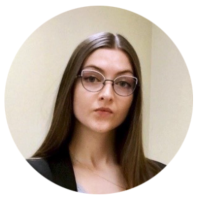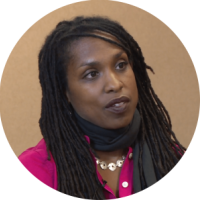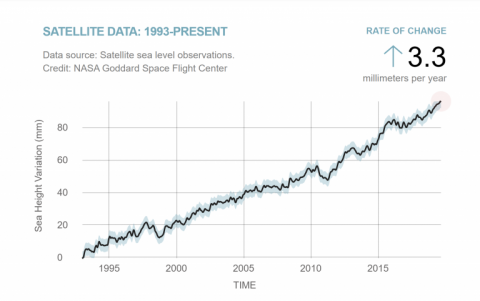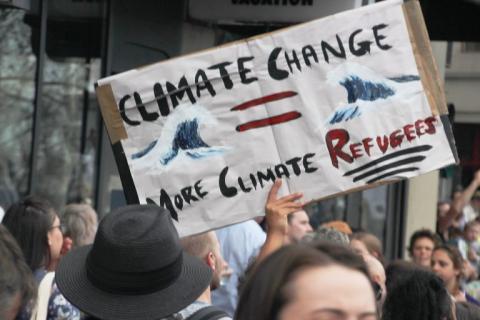Warrior Lawyer Profile: Maxine Burkett

Rachel Garrett
Allard JD 2021
Feb 3, 2020
Pursuing climate justice for island communities

Fish in the streets, sinking cities, and an octopus in a parking garage – these are all real events that have occurred over the last few years as a result of rising sea levels. Maxine Burkett, Professor of Law at the University of Hawaii, says that these shocking events are not getting enough attention. “Climate change is not the elephant in the room but the octopus in the parking lot,” she said in 2018.
Alongside teaching Climate Change Law and Policy, Burkett spends her time figuring out how to help the marginalized communities most impacted by climate change. Living and raising her children on the island of Oahu, she sees first-hand the urgency small island communities are facing with rapidly rising sea levels.

Coming into law school with an internship at The White House under her belt, Maxine Burkett received her JD from the University of California Berkeley School of Law in 2002. She went on to complete a clerkship with the United States District Court for the Northern District of California and became an associate at a law firm in Honolulu. Burkett quickly moved into the academic space, starting as an Associate Professor of Law at the University of Colorado just four years after graduating from law school, teaching Environmental Law and Race and American Law.
Burkett uses her writing as a tool to address the burgeoning problem of climate displacement. Much of her writing focuses on the disproportionate impact climate change has on poor communities and communities of colour. She has been featured in a number of news and policy outlets, acting as an environmental communicator to an oft-underinformed or misinformed public.
While the work of writing and sharing these legal ideas may not look like the emblematic “warrior lawyer” litigating on the front lines of prominent environmental cases, the work Burkett is doing in researching solutions for these vulnerable island nations makes her a different type of legal warrior.
A common thread in Burkett’s work is the belief that the rapid implementation of legal instruments to aid displaced islanders is fundamental to the legal futures of these communities. Burkett’s writing contemplates solutions to the many legal problems faced by shrinking island nations. For non-islanders this may not be something on our day-to-day radar, but for a resident of the Marshall Islands or the Maldives, the issues she researches can have a major impact on their communities. Her ideas include the use of negligence lawsuits or Indigenous land claims litigation to help small communities facing displacement to secure land, using property law tools like conservation easements in supporting relocation efforts, and theorizing a mechanism for providing financial compensation or climate reparations to suffering states.
Maxine Burkett is doing the important work of figuring out legal solutions to the tangible problems island communities are facing in the current climate crisis.

Photo: Takver from Australia (CC BY-SA 2.0)
Burkett believes diversity and inclusion need to be baked into the foundation of climate justice. To do this, she promotes the idea of transitional justice. Burkett describes transitional justice as a truth and reconciliation approach, allowing for those victimized to co-create solutions with the perpetrators. These solutions can include criminal prosecutions, reparations, truth commissions, and institutional reform. Transitional justice allows the harmed communities to be a part of building policy to not only repair damage but prepare for additional damage in the future. This is the ‘transition’ between the crisis and a more stable future.
To Burkett, this idea of transitional justice often involves a recognition that the harm done to these communities through climate change may mean that these islands will never wholly return to the full territory they once had. This grim prospect necessitates serious consideration of what solutions we’re contemplating moving forward – we not only need to innovate with clean technology, but we need to consider the impact of our solutions on those most marginalized. Burkett invites us to consider whether seemingly promising solutions actually involve the displacement of Indigenous communities.
As Burkett told The Green Interview’s Silver Donald Cameron in 2017, “We’re thinking about how to have cleaner energy, but are we considering whether or not that involves displacing Indigenous communities in and of itself?”
As a global community, we are facing unprecedented events that are becoming more common as the climate crisis escalates. Individuals like Maxine Burkett are developing concrete and specific solutions to the problems vulnerable island communities are facing as sea levels continue to rise. Burkett’s work is an important reminder that “warrior lawyers” come in many forms. From impassioned litigators to climate researchers, legal professionals can step up in a number of different ways to aid vulnerable communities in the climate crisis.
You can watch Silver Donald Cameron’s 2017 interview with Maxine Burkett on The Green Interview website, which contains interviews with more than 100 environmental thinkers, defenders, lawyers and activists around the world, along with feature-length documentary films about struggles for environmental rights (teasers are free; full access requires a modest subscription).
- Centre for Law and the Environment


